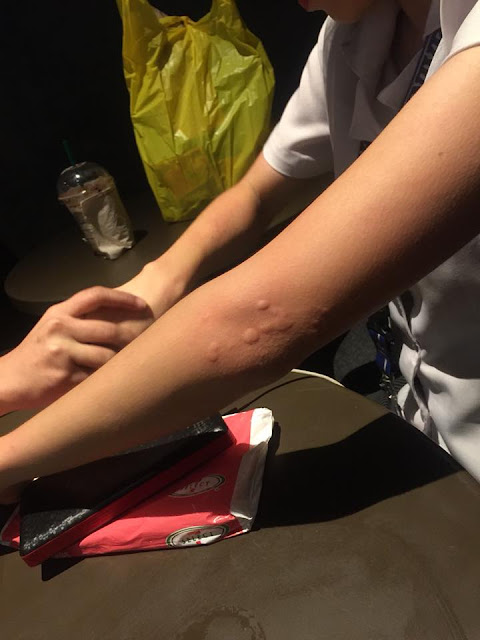A Young Girl noticed How Her skin became Reddish and Itchy after Cold Exposure which result to a Very Serious Allergy
Photo Creditts to owner Certain people appear to have a very sensitive skin cells and this is due to an inherited trait, a virus or an i...
https://newsmakerphilippines.blogspot.com/2018/03/a-young-girl-noticed-how-her-skin.html
 |
| Photo Creditts to owner |
A netizen posted on her facebook account regarding on what she noticed something happening in her skin after being expose in a cold area. On her facebook account, Asne Marohombsar shared what she experienced when she was having reddish thing and itchyness on her skin.
On her facebook account she posted.
Hello mga beshy! I just want to inform you na ang allergy sa lamig ay nag-eexist! Yeah right. May ganung allergy po talaga. This is what we call "Cold Urticaria". What is Cold Urticaria? Cold urticaria (ur-tih-KAR-e-uh) is a skin reaction to cold that appears within minutes after cold exposure. Affected skin develops reddish, itchy welts (hives).
People with cold urticaria experience widely different symptoms. Some have minor reactions to the cold, while others have severe reactions. For some people with this condition, swimming in cold water could lead to very low blood pressure, fainting or shock. Cold urticaria signs and symptoms may include:
-Temporary reddish, itchy welts (hives) on the area of skin that was exposed to cold
-A worsening of the reaction as the skin warms
-Swelling of hands while holding cold objects
-Swelling of lips from consuming cold food or drink
Severe reactions may include:
-A whole-body response (anaphylaxis), which can cause fainting, a racing heart, swelling of limbs or torso, and shock
-Swelling of the tongue and throat, which can make it difficult to breathe
Cold urticaria symptoms begin soon after the skin is exposed to a sudden drop in air temperature or to cold water. Damp and windy conditions may make a flare of symptoms more likely. Each episode may persist for about two hours.
The worst reactions generally occur with full skin exposure, such as swimming in cold water. Such a reaction could lead to loss of consciousness and drowning. If you have skin reactions after cold exposure, see your doctor. Even if the reactions are mild, your doctor will want to rule out underlying conditions that may be causing the problem.
Seek emergency care if after sudden exposure to cold you experience a whole-body response (anaphylaxis) or difficulty breathing.
And yeah, para sa mga taong gaya ko na nahihirapan mag-stay sa malalamig na lugar, meron tayong allery sa lamig. HAHAHAHAHAHA!
P.S. As a Kpop fan, hindi na ako umaasang makakapunta pa ako ng South Korea dahil baka atakihin ako neto doon😂
Yes she was right, Cold urticia is a skin reaction to cold that appears within minutes after cold exposure. People with cold urticaria experience widely different symptoms. Some have minor reactions to the cold, while others have severe reactions. For some people with this condition, swimming in cold water could lead to very low blood pressure, fainting or shock.
The causes of these skin allergies has nothing to explain as of now, no one know exactly what causes of cold urticacia.
Take a look of these photos
 |
| facebook.com/JeonAsnaenae |
| facebook.com/JeonAsnaenae |
 | |
|
 | |
|
 | |
|
 | |
|
Risk factors should propably if you're young adult, it is the most common type primary acquired cold urticaria to young adults. Another one is if you're having an underlying health condition can be caused by such as hepatitis or cancer. And also, cold urticaria is inherited. This familial type causes painful welts and flu-like symptoms after exposure to cold.
For Prevention,the following tips may help prevent a recurrent episode of cold urticaria.
- Take an over-the-counter antihistamine before cold exposure.
- Take medications as prescribed.
- Protect your skin from the cold or sudden changes in temperature. If you're going swimming, dip your hand in the water first and see if you experience a skin reaction.
- Avoid ice-cold drinks and food to prevent swelling of your throat.
- If your doctor prescribed an epinephrine autoinjector (EpiPen, Auvi-Q, others), keep it with you to help prevent serious reactions.
- If you're scheduled for surgery, talk with your surgeon beforehand about your cold urticaria. The surgical team can take steps to help prevent cold-induced symptoms in the operating room.
Source: Facebook, MayoClinic.org











